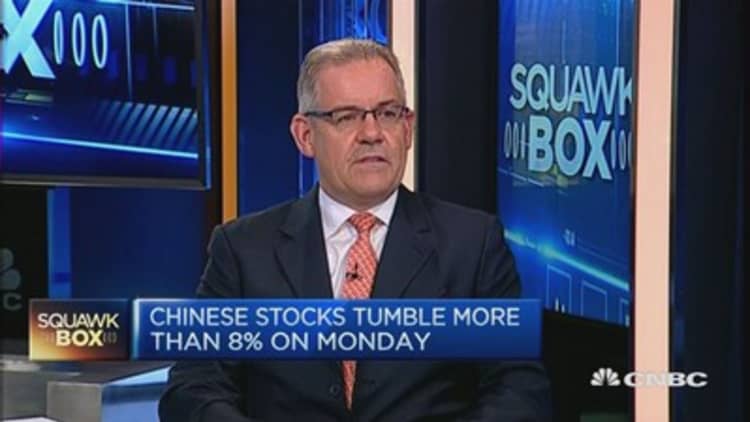Asian stocks edged up from session lows on Tuesday, taking their cues from the mainland where the benchmark Shanghai Composite index recouped some losses after trading down as much as 5.1 percent early Tuesday.
Investors also kept an eye on the continued sell-off in the commodity space; gold prices languished near its weakest level since early 2010 on Tuesday, at $1,093.45 an ounce, as expectations for a rate hike in the U.S. kept momentum firmly with the bears. Meanwhile, U.S. crude futures fell towards $47 a barrel, close to a four-month low, in early Asian trade.
Wall Street sank overnight, with the shaving off 1 percent. The lost 0.7 percent to end at a five-month low, while the closed down 0.6 percent to chalk up a five-session losing streak for the first time since January.
Mainland markets mixed
The Shanghai bourse ended down 1.7 percent in a volatile session, even though authorities unveiled fresh rescue measures following the more than 8 percent plunge on Monday.
The China Securities Regulatory Commission said late Monday that the local government will increase purchases of stocks in an effort to support the equity market, while the central bank injected cash into money markets and hinted at further monetary easing.
On late Tuesday, the country's securities regulator says it is investigating "share dumping incidents that occurred on Monday," according to Reuters.
However, the Shanghai Composite swung between gains of more than 1 percent and losses as much as 5 percent throughout the session, raising fears of a fresh stock market rout in the world's second-biggest economy.
Among China's other indexes, the CSI300 index and the smaller Shenzhen Composite notched down 0.2 and 2.2 percent, respectively. In Hong Kong, the Hang Seng index bucked the downtrend to rise 0.6 percent.
Some analysts fear there's more pain to come in the coming trading days.
"Investors are still very cautious of the performance of the A-shares and we may see further drop of the A-share index," Ronald Wan, chief executive of investment banking at Partners Capital International, told CNBC. "When there [are] negative news, investors compete with each other to get out so we will see volatility. Investors are also not confident of whether the rescue package is sustainable so we will see further deterioration in investment sentiment over the next few days [and] hence further drop [in the index] is expected."
Read MoreChina stock exodus: When will it end?
After three weeks of relative stability in the mainland markets, the key Shanghai bourse plummeted 8.5 percent on Monday - its biggest one-day drop in eight years - as latest economic data served up fresh growth concerns. Data released on Monday showed industrial profits down 0.3 percent year-on-year in June, while Friday's preliminary China Caixin purchasing managers index (PMI) surprised markets by dropping to a 15-month low in July.
Concerns that Beijing may be reluctant to dole out further support measures and the slump below the key psychological level of 4,000 points also contributed to Monday's sell-off, analysts said.
"4,000 was a key level for a lot of people. Once it started falling below that, locking in gains or minimizing one's downside becomes a priority," Andrew Sullivan, managing director for sales trading at Haitong International Securities, told CNBC Asia's "Squawk Box."
Meanwhile, shares of China Eastern Airlines dropped 3.7 percent in Shanghai and 3.9 percent in Hong Kong, after Delta Air Lines agreed to buy 3.55 percent of the Chinese carrier.

Nikkei sheds 0.1%
Japan's Nikkei 225 pulled back to neutral territory by the end of Tuesday, paring losses which took the bourse down to a fresh two-week low earlier at the open.
Among gainers, index heavyweight Fast Retailing charged up nearly 2 percent, while Canon bounced up 0.2 percent after the company's second-quarter net profit beat market expectations, despite a 16 percent fall year-on-year. The world's largest camera maker said on Monday its second-quarter net profit fell to 68 billion yen ($552 million) compared with 81 billion yen a year earlier. Analysts polled by Reuters had expected 65 billion yen.
ANA Holdings also bucked the downtrend with an addition of 0.6 percent, helped by a Nikkei business daily report that the carrier's April-June operating profit likely rose to the highest in seven years.
However, counters with a heavy China exposure remained downbeat, with construction equipment makers Komatsu and Hitachi Construction Machinery slumping 2.7 and 2.3 percent, respectively.
Suntory Beverage & Food closed down 0.9 percent after denying a report by the Nikkei newspaper that its parent Suntory Holdings is considering an initial public offering (IPO) of its own.

ASX flat
Australia's index erased early declines as the meltdown in China - Australia's biggest trade partner - took a breather.
Early-trade laggards mostly recouped losses; Woodside Petroleum and Santos notched up 1.7 and 0.6 percent, respectively, while Rio Tinto added 0.2 percent.
Commonwealth Bank of Australia and Australia and New Zealand Banking drifted 0.3 percent higher each, while National Australia Bank and Westpac shed 0.2 and 0.4 percent, respectively.
However, gold miners continued to struggle, with Newcrest Mining leading losses in the sector with a 2 percent plunge.
Kospi flat
South Korea's Kospi index pared losses to finish near its previous day's close.
Specific stocks were in focus; Doosan Infracore closed down 3.9 percent on the back of below-view second-quarter operating profit. The heaviest-weighted stock Samsung Electronics finished flat after swinging between gains and losses, ahead of its quarterly earnings on Wednesday.
The country's Prime Minister declared the deadly outbreak of Middle East Respiratory Syndrome (MERS) over, Yonhap news agency reported early Tuesday. The spread of the deadly virus has taken a toll on the fourth-biggest economy in Asia, with gross domestic product (GDP) expanding a meager 0.3 percent on-quarter in the April-June period, as weaker consumer sentiment exacerbated the woes of an already-fragile economy battling with struggling exports.
As such, tourism-related plays and retailers traded mostly in the positive territory. Hotel Shilla and Lotte Shopping gained 1.5 and 1.8 percent, respectively, while AmorePacific ended up 1.7 percent.

